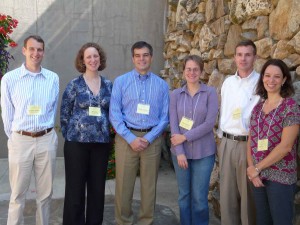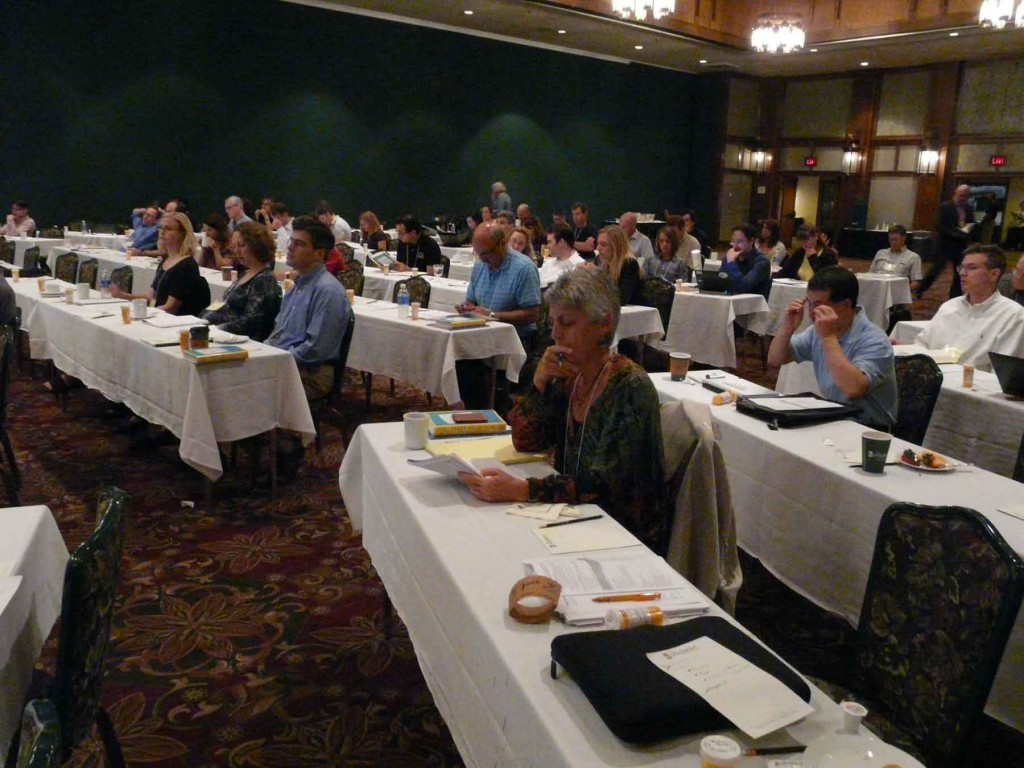“Once a Beeson,” said the speaker, and more than 100 voices in the audience completed the refrain, “always a Beeson!”
And thank goodness.
 The cheer was led by Dr. Bill Hazzard, a pioneer in geriatric medicine, and the event was the 2010 annual meeting of the Beeson Scholars—a group of extraordinary young researchers who successfully competed for the prestigious Paul B. Beeson Career Development Award in Aging Research, administered by the American Federation for Aging Research and funded through a public-private partnership between the John A. Hartford Foundation, the National Institute on Aging, and other partners. At the meeting in scenic Asheville, NC, eight new scholars were introduced (six appear in the photo) and eight scholars graduating from the program after their five years of funding presented their research findings. These outstanding physician faculty members from a variety of disciplines and academic medical centers across the country were joined by their mentors and alumni of the program, some from its very beginning in 1994.
The cheer was led by Dr. Bill Hazzard, a pioneer in geriatric medicine, and the event was the 2010 annual meeting of the Beeson Scholars—a group of extraordinary young researchers who successfully competed for the prestigious Paul B. Beeson Career Development Award in Aging Research, administered by the American Federation for Aging Research and funded through a public-private partnership between the John A. Hartford Foundation, the National Institute on Aging, and other partners. At the meeting in scenic Asheville, NC, eight new scholars were introduced (six appear in the photo) and eight scholars graduating from the program after their five years of funding presented their research findings. These outstanding physician faculty members from a variety of disciplines and academic medical centers across the country were joined by their mentors and alumni of the program, some from its very beginning in 1994.
We should be very grateful that Beeson alumni still see themselves as part of something larger than their individual research careers. Together the 162 current and former Beeson Scholars create a powerful network of some of the brightest minds in the science of aging. They are finding solutions, often in collaboration, for many of the biggest problems facing older adults, from ways to detect and treat Alzheimer’s disease to improving the outcomes for older ICU and emergency department patients.
The newer junior faculty scholars are rightly focused on building their research programs and determining how best to further develop their successful academic careers (and several sessions focused on just this). However, it was clear from their presentations and conversation that they too will one day join the ranks of their Beeson predecessors who are now department chairs, leaders within their professional specialty societies, and government and policy experts shaping health care for this country. Dr. Arti Hurria, now at the City of Hope Cancer Center in California, is one example. Her research on developing a useful assessment tool for oncologists working with older adults has the potential to help avert adverse chemotherapy reactions, improving the safety and quality of life for these older patients. In addition to her research, she is helping to lead a group of aging-focused oncologists who aim to transform cancer care for the vulnerable elderly.
 In recognition of the Beeson Scholars’ potential power to lead change, several speakers presented on the theme of how aging research can influence policy. Dr. Elliott Fisher, well known for his work with the Dartmouth Atlas spoke about health reform and the need for careful implementation of the recently passed Affordable Care Act. He suggested that scholars play a role in leading change within their own health systems and reminded his audience that when it comes to reform, we are “all in this together.”
In recognition of the Beeson Scholars’ potential power to lead change, several speakers presented on the theme of how aging research can influence policy. Dr. Elliott Fisher, well known for his work with the Dartmouth Atlas spoke about health reform and the need for careful implementation of the recently passed Affordable Care Act. He suggested that scholars play a role in leading change within their own health systems and reminded his audience that when it comes to reform, we are “all in this together.”
Another panel relayed the message that “policy” change can happen at many levels. Scholars can effect meaningful change even outside the legislative realm, by revising international guidelines for the care of older patients in the ICU, working on quality improvement initiatives with the American Medical Association, becoming medical director of a health plan, or by holding a position in a state department of health, for example. At the very least, good research and data on older adults are absolutely necessary for good policy. Because of this, as Dr. Al Siu from the Mount Sinai Department of Geriatrics remarked, each scholar’s work is “policy-relevant, whether it is obvious, below the surface, or several steps removed.”
 As we left the Blue Ridge Mountains in the distance, I hope all of the Beeson Scholars came away from the meeting as energized and excited about their work in aging research as I was. I hope they felt connected to and embraced by the Beeson network. I also hope they saw how important their collective body of research is to making real change in the health of older adults, not only through advancements in science, but through the changes in policy and the health care system that their science will support.
As we left the Blue Ridge Mountains in the distance, I hope all of the Beeson Scholars came away from the meeting as energized and excited about their work in aging research as I was. I hope they felt connected to and embraced by the Beeson network. I also hope they saw how important their collective body of research is to making real change in the health of older adults, not only through advancements in science, but through the changes in policy and the health care system that their science will support.
